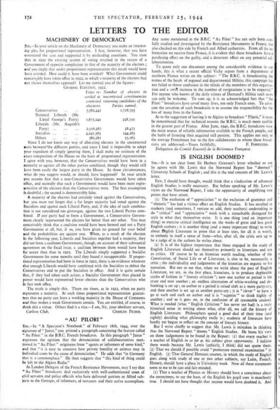MACHINERY OF DEMOCRACY
LETTERS TO THE EDITOR
Stn,—In your article on the Machinery of Democracy you make an interest- ing plea for proportional representation. I fear, however, that you have overstated the case and supported it by misleading assertions. You state that in 1922 the existing system of voting resulted in the return of a Government of opposite complexion to that of the majority of the electors ; and you imply that under proportional representation this result would have been avoided. How could it have been avoided? What Government could conceivably have taken office in 1922, to which a majority of the electors had not shown themselves opposed? Let me remind you of the figures: GENERAL ELECTION, 1922.
Votes re- Number of electors • in corded at uncontested constituencies contested returning candidates of the elections. Parties named.
Conservatives ... 5,582,441 1,718,795 National Liberals (Mr.
Lloyd George's Party) 1,673,240 228,70o Liberals (Mr. Asquith's Party) ... ... 2,516,287 28,471 Socialists ... • • • 4,241,383 144,265 Others ... 380,281 55,163 Since I do not know any way of allocating electors in the uncontested seats between`the different parties, and since I find it impossible to adopt your expedient of simply ignoring them, I shall make no estimate of the exact composition of the House on the basis of proportional representation. I agree with you, however, that the Conservatives would have been in a minority as against all the other parties combined, though they would still stave been easily the largest party in the House. In those circumstances, what do you suggest would, or should, have happened? In your article you assume first that a non-Conservative Government would have taken office, and secondly that such a Government would have been more repre- sentative of the electors than the Conservatives were. The first assumption is doubtful ; the second is demonstrably false.
A majority of the electors had certainly voted against the Conservatives, but you must not forget that a far larger majority had voted against the Socialists and against each Liberal Party, and, if the idea of such combina- tion is not considered too grotesque, against the two Liberal Parties com- bined. If any party had to form a Government, a Conservative Govern- ment clearly represented the electors far better than any other. You may conceivably think that a coalition would have been formed and not a Party Government at all, but, if so, you have given no ground for your belief and the probabilities are against you. When, as a result of the election In the following year, Liberals and Socialists together had a majority, they did not form a coalition Governmentohough, on account of their substantial agreement on the fiscal issue, a coalition between them would have been far easier then than in 1922. The Liberals simply supported a Socialist Government for some months until they found it insupportable. If propor- tional representation had been in force in 1922, there is no evidence whatever that enough Liberals would have combined with the Socialists to defeat the Conservatives and to put the Socialists in office. And it is quite certain that, if they had taken such action, a Socialist Government thus placed in power would have represented fewer electors than the Conservatives who in fact took office.
The truth is simply this. There are times, as in 1922, when no party represents a majority. At such times proportional representation guaran- tees that no party can have a working majority in the House of Commons and thus makes a weak Government certain. You are entitled, of course, to think this a virtue. Others find it a vice.—I am, Sir, your obedient servant,


























 Previous page
Previous page